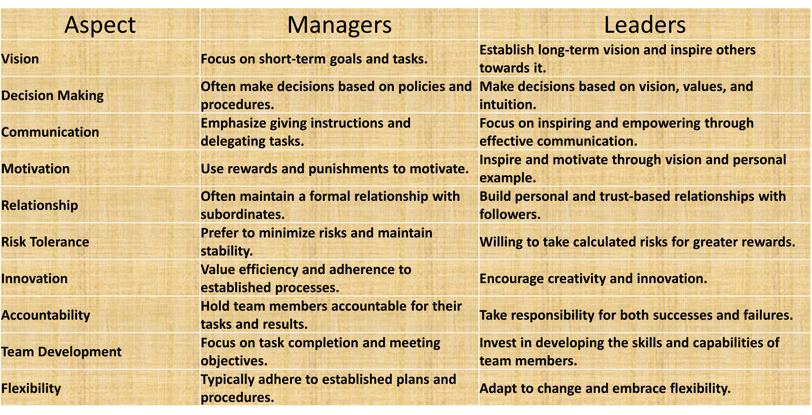Leaders vs. Managers: Understanding the Distinction in Modern Organizations
Learn about what is the difference between Managers and Leaders , how a good leaders interchange roles according to situation


In the realm of organizational dynamics, the distinction between leaders and managers often sparks debate. While both roles are crucial for the success of any business, they encompass different skill sets, responsibilities, and approaches. Understanding the nuances between leaders and managers is essential for cultivating a harmonious and effective workplace environment.
The Essence of Leadership
Leadership transcends mere authority; it is about inspiring, motivating, and guiding others towards a common vision or goal. Leaders possess a clear sense of purpose and direction, and they have the ability to articulate and communicate this vision effectively. They lead by example, inspiring their teams through their actions, integrity, and passion.
One of the defining characteristics of effective leaders is their focus on innovation and adaptation. They are forward-thinking individuals who embrace change and encourage creativity within their teams. Instead of adhering strictly to established norms and procedures, leaders are willing to take calculated risks and explore new opportunities. They empower their team members to think outside the box and challenge the status quo, fostering a culture of innovation and continuous improvement.
Moreover, leaders prioritize people over processes. They recognize the unique strengths and talents of each team member and strive to nurture and develop their potential. By fostering a culture of trust, respect, and collaboration, leaders create an environment where individuals feel empowered to contribute their best work and achieve their full potential.
The Role of Management
While leadership sets the overarching vision and direction, management focuses on execution and implementation. Managers are responsible for planning, organizing, and coordinating the day-to-day operations of the organization to ensure that goals are met efficiently and effectively. They establish processes, allocate resources, and monitor progress to ensure that projects are completed on time and within budget.
Managers excel at problem-solving and decision-making within the constraints of established procedures and guidelines. They are adept at analyzing data, identifying bottlenecks, and optimizing workflows to improve productivity and efficiency. Unlike leaders, who thrive in ambiguity and uncertainty, managers prefer clear structures and defined roles to ensure smooth operations.
Additionally, managers play a crucial role in providing feedback, coaching, and performance evaluation. They offer guidance and support to their team members, helping them navigate challenges and develop the skills needed to succeed in their roles. By setting clear expectations and holding individuals accountable for their actions, managers maintain order and discipline within the organization.
Finding the Balance
In today's fast-paced and complex business environment, the distinction between leadership and management is becoming increasingly blurred. Successful organizations recognize the need for individuals who can seamlessly transition between both roles, leveraging their unique strengths to drive organizational success.
Leaders who possess strong management skills can effectively translate their vision into actionable plans and strategies, ensuring that goals are achieved efficiently. Similarly, managers who demonstrate leadership qualities can inspire and motivate their teams to go above and beyond expectations, fostering a culture of excellence and innovation.
Ultimately, the key to organizational success lies in striking the right balance between leadership and management. By cultivating a diverse team of individuals who excel in both roles, organizations can navigate uncertainty, drive innovation, and achieve sustainable growth in today's competitive landscape.

